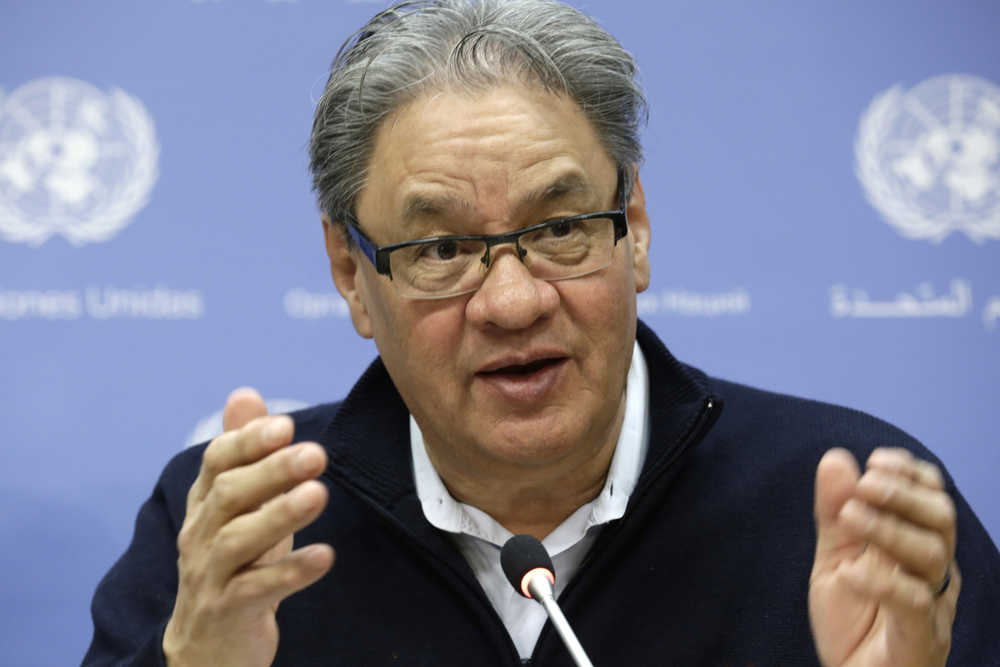UNITED NATIONS — A Canadian tribal chief is calling for urgent efforts to revive indigenous languages, saying their extinction is going unnoticed while the world focuses on the preservation of cultural heritage sites.
Edward John, a member of the U.N. Permanent Forum on Indigenous Issues, told a news conference that ancient wonders are important but indigenous languages are “the essential component of cultural heritage” and should get international attention and support to ensure their survival.
John spoke Thursday at the end of a three-day meeting of indigenous language experts at U.N. headquarters on revitalizing many of the estimated 6,000 to 7,000 languages spoken by native peoples around the world.
“The priority focus that I hear from all of the experts is, create fluent speakers,” he said. “That’s what you need to do. How do you do it? That’s the discussion taking place.”
“There’s been a large focus on literacy, developing books and calendars and dictionaries” in indigenous languages, John said, “but not as much of an effort in fluency.”
John pointed to Secretary-General Ban Ki-moon’s address in May 2011 to the Permanent Forum on Indigenous Issues where he said: “Today, one indigenous language dies every two weeks. Indigenous cultures are threatened with extinction.”
What’s needed urgently is a commitment from every government to identify the indigenous languages in their country and the number and age of speakers so that a global map of where they are can be drawn up for the first time, he said. Then, the focus must be on revitalizing those with fewer speakers and finding the resources to keep languages from becoming extinct.
“We know there are some languages where there are less than a handful of speakers left, and when they’re gone that language is gone and everything — everything about that culture and that heritage is gone as well,” John said.
Tatjana Degai, an ethnic Itelman from Kamchatka on Russia’s Pacific coast, said her people’s language “is severely endangered.”
“There are only five elderly speakers left, all of them female speakers, about 70 years old,” she said. “There are about 10 to 15 middle-aged speakers who grew up hearing the language but don’t consider themselves speakers.”
Degai, who is trying to help keep the language alive, said Itelman is taught in only one school, and for just 40 minutes a week.
“We appreciate that Russia is developing legislation in relation to indigenous language but we also think that it is not enough for our language to survive,” she said.
Degai said Itelman is not the only language in trouble — 40 of the 47 recognized indigenous peoples in Russia are from the north, Siberia and the Far East, and most of their languages “are at the brink of extinction.”
Amy Kalili, a native Hawaiian who heads an education organization promoting fluency in the Hawaiian language, said that in middle of the last century there were perhaps 30 speakers under the age of 18. But she said there was “a cultural renaissance” in the late 1970s and early 1980s, and now schools are educating 3,000 students a year in Hawaiian.
“People are passionate about not letting language die,” Kalili said, and not just in Hawaii.
She said the Maoris in New Zealand not only get education in their own language but they have government-funded Maori language radio and television channels.
John, who is grand chief of the Tl’azt’en Nation in British Columbia, said he attended a residential school for native Canadians and was banned from speaking Dene, a language also spoken in Alaska and the northwestern and southwestern United States by native Americans.
He said smart phones and technology should become tools to help teach young people today their native languages.
Google sent an expert to this week’s meeting, he said, and “we will reach out to all willing partners to help us in this gigantic effort of revitalization.”
John said recommendations from this week’s meeting will be presented to the Permanent Forum meeting in May, and then to the U.N. Economic and Social Council in July.

